|
|
|
Sort Order |
|
|
|
Items / Page
|
|
|
|
|
|
|
| Srl | Item |
| 1 |
ID:
183983


|
|
|
|
|
| Summary/Abstract |
The ‘Movement for the Entire Land of Israel’, was formed by activist members of the Labour movement shortly after the June 1967 war. Its founders struggle for “Greater Israel” and espoused the establishment of settlements that would secure the Israeli hold on the territories occupied during the war. During the 1970s, however, the movement had effectively come to be spearheaded by Gush Emunim (Bloc of the Faithful), a newly-created religious-nationalist activist group. This article describes this transition while examining the factors that enabled this process despite the two groups’ very different political, social, cultural ideals and intergenerational backgrounds.
|
|
|
|
|
|
|
|
|
|
|
|
|
|
|
|
| 2 |
ID:
143112
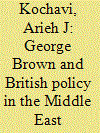

|
|
|
|
|
| Summary/Abstract |
In the aftermath of the 1967 Arab-Israeli War, relations between Britain and the Arab world improved, particularly with Egypt, and also with Jordan. This article shows the driver of this decisive shift in policy was the initiative of Foreign Secretary George Brown. Well aware of the aversion some of his colleagues felt toward Egyptian president Gamal 'Abd al-Nasser and anger over King Husayn of Jordan's defense pact with the Egyptian leader, Brown opted to maneuver behind the government's back and did not hesitate to manipulate and even deceive both the government and Prime Minister Harold Wilson.
|
|
|
|
|
|
|
|
|
|
|
|
|
|
|
|
| 3 |
ID:
161896
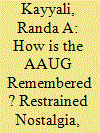

|
|
|
|
|
| Summary/Abstract |
The events and reasons behind the closure of the AAUG Washington DC office and the subsequent disbanding of the entire organization, with the notable exception of the Arab Studies Quarterly is described here by the last acting Executive Director. This essay helps to fill a major lacuna in the written history of a major Arab American activist organization.
|
|
|
|
|
|
|
|
|
|
|
|
|
|
|
|
| 4 |
ID:
088190


|
|
|
| 5 |
ID:
167788
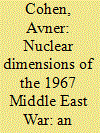

|
|
|
|
|
| Summary/Abstract |
For many years, the nuclear dimensions of the 1967 Middle East War were unacknowledged and obscure. In the last two decades, however, bits and pieces of evidence have surfaced about this issue. This article reviews and assesses the current state of knowledge on these aspects of the pre-war crisis, i.e., what we know with confidence, what we suspect, and what remains unknown. The first section explores the prewar background: the state of Israel’s nuclear project as well as the Israeli perception of Dimona as a possible trigger for war. The second part deals with the two nuclear dimensions of the crisis itself. The first is the role of Dimona in shaping, even precipitating, the Israeli response to the crisis. The second is the crash nuclear-related activity that took place during the crisis. The article reviews recent testimonies on how Israel assembled its first nuclear-explosive device while exploring operational ideas for improvising a “last resort” demonstration.
|
|
|
|
|
|
|
|
|
|
|
|
|
|
|
|
| 6 |
ID:
114692
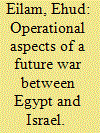

|
|
|
|
|
| Publication |
2012.
|
| Summary/Abstract |
The peace treaty between Israel and Egypt has survived since 1979. Even so, following the events in Egypt, there is a growing tension between the two states, particularly surrounding the Sinai, which could cause a crisis and even a war. In such a case, the main battlefield would be in Sinai, and there would be several dominant aspects. Some of them would appear for the first time, compared with previous wars, such as a collision between Israeli and Egyptian units of around corps size. Other aspects would be more familiar, such as the ratio between the size of the forces to that of the battlefield, the "fog of war," night fighting, "friendly fire" and deception.
|
|
|
|
|
|
|
|
|
|
|
|
|
|
|
|
| 7 |
ID:
124615
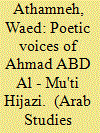

|
|
|
|
|
| Publication |
2013.
|
| Summary/Abstract |
This article examines the poetic voices of Egyptian poet Ahmad Abd al-Mu'ti Hijazi in five representative poems written between 1950 and 2011. It investigates the role of major political events in the Arab world on his trajectory and poetic voice. The article argues that Hijazi changes his poetic voice in relation to the status quo in Egypt. The article concludes that these voices conflict and clash with one another. Hijazi publishes a collection of poetry after the eruption of the Egyptian Revolution in January 2011, to inspire his people, protest against Mubarak's regime, and regain his poetic voice.
|
|
|
|
|
|
|
|
|
|
|
|
|
|
|
|
| 8 |
ID:
191921
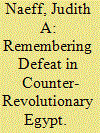

|
|
|
|
|
| Summary/Abstract |
This article analyses how a creative writing workshop in 2017 Cairo dynamically engaged with cultural memories of the 1967 defeat of the Arab armies. The article first situates 1967 as a crucial reference point in discursive attempts to tie personal life stories to national history and in making sense of a widespread feeling of postcolonial disenchantment. It is in the ruinous aftermath of the 2011 uprisings, when a view on a political horizon beyond the stifling present temporarily was reopened, that the workshop critically examined the relations between cultural memory, family history, and everyday life with, at its center, the notion of defeat in all its shapes and intensities. The article argues that the workshop can be seen as ‘an intimate public,’ carving out a space for survival lying largely outside of the sphere of politics. Nevertheless, in its affective plurality that stimulated modes of irreverence, the workshop tentatively opened up new political dispositions under the strenuous conditions of post-2013 Egypt.
|
|
|
|
|
|
|
|
|
|
|
|
|
|
|
|
| 9 |
ID:
161898
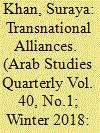

|
|
|
|
|
| Summary/Abstract |
This article examines how the Association of Arab-American University Graduates (AAUG) articulated the Palestine question as both an Arab-American and a Third World issue after the 1967 War. Using archival documents and recollections from several AAUG members, this article traces the ways in which activism on Palestine and other issues facilitated the creation of a transnational Arab-American “intellectual generation.” Although the AAUG often focused on Palestine, it educated its members and engaged in activism on issues affecting other communities who grappled with racism, imperialism, and colonialism. In doing so, it attracted diverse allies to the Palestinian cause, such as Black Americans, Africans, South Asians, and other members of the “global Third World.” This article further analyzes the AAUG's transnational engagement with the Palestinian Liberation Organization (PLO) during its first decade. Using both traditional and academic activism, the AAUG firmly associated Palestine with the Third World and fostered an Arab-American intellectual movement.
|
|
|
|
|
|
|
|
|
|
|
|
|
|
|
|
|
|
|
|
|